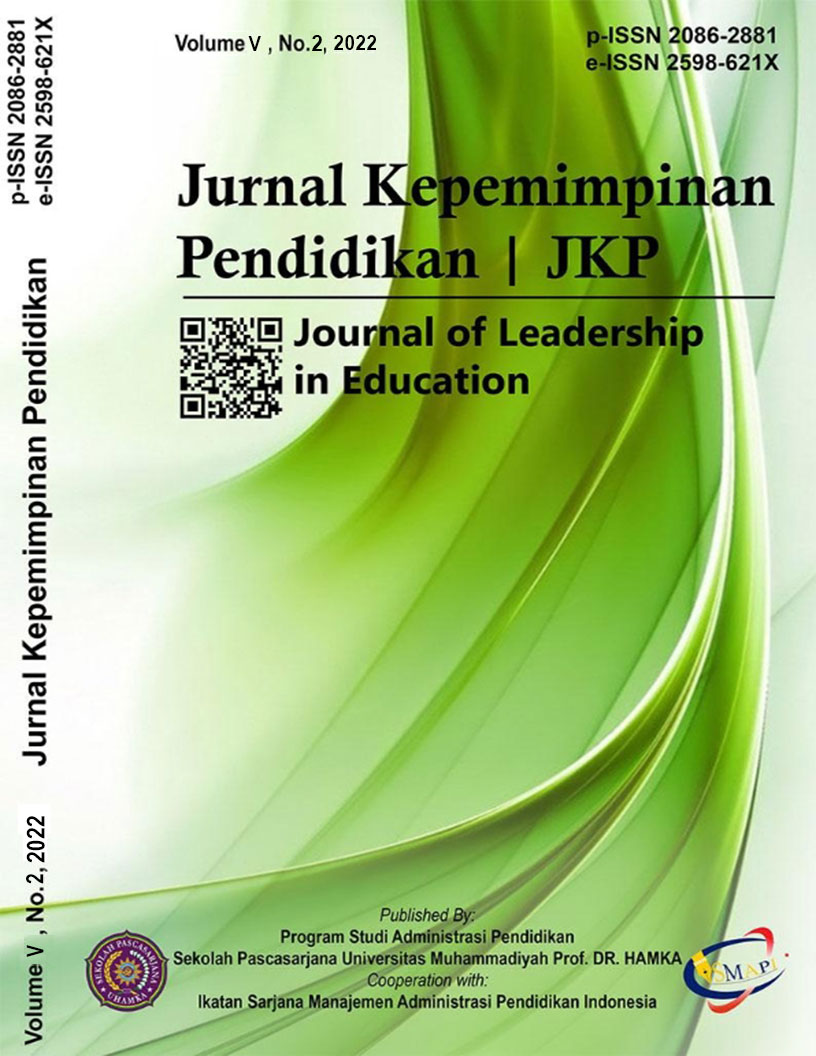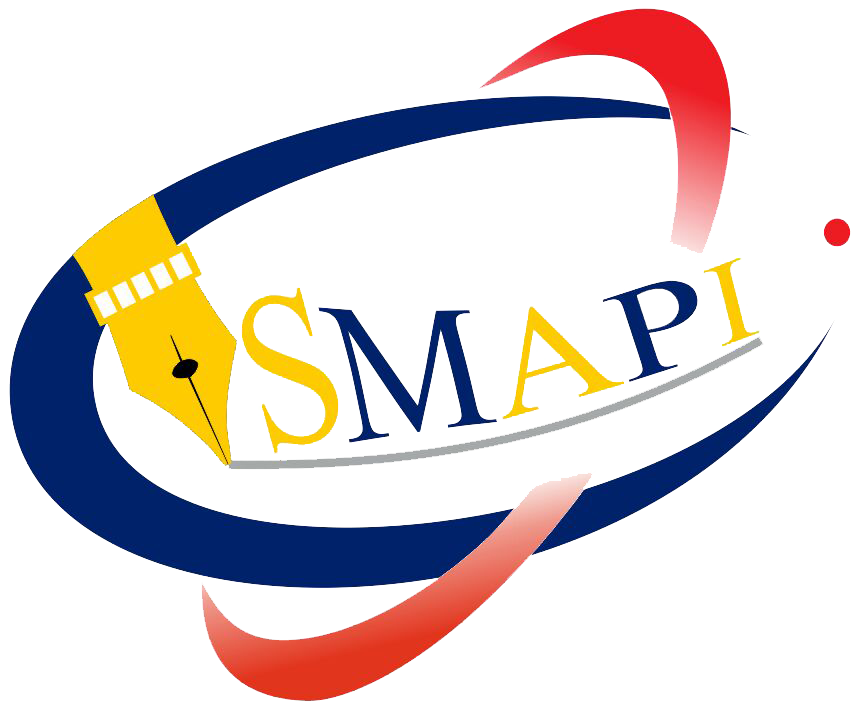EVALUATION OF INCLUSIVE EDUCATION PROGRAM IMPLEMENTATION
DOI:
https://doi.org/10.22236/jkpuhamka.v5i2.11222Keywords:
program evaluation, inclusive education, CIPP ModelAbstract
This study aims to evaluate the inclusive education program at SDN 14 Jatinegara Kaum, East Jakarta. Descriptive qualitative research method with the CIPP model (context, input, process, product). Sources of informants consisted of school principals, Curriculum/Student Affairs Section, Special Assistance Teachers, Shadow Teachers, Class Teachers, Guardians of Inclusive Students. Research using interviews, observation, documentation. Then the data were analyzed by reduction, presentation and conclusion. Based on the research, the results were obtained: In the context aspect, Vision, mission and objectives are not yet in favor of inclusive students. In the input aspect, financing and infrastructure do not support the inclusion program. In the process aspects of the teaching and learning process and assessments are not maximized, inclusion students still experience difficulties in following learning and the assessment process are still the same as regular students. In the product aspect the results of the inclusive program research are not maximized, because they place more emphasis on non-academic (self-help, social development) but there are still deficiencies in reading development and menus.
Downloads
References
Adhi, M. ., & Seniwati, N. (2017). Buku panduan pendidikan inklusif sekolah dasar. PT.Percetakan Bali.
Alfiansyah, M. I. (2019). Implementasi pendidikan inklusi di Sekolah Kejuruan Negeri (SMKN) 2 Kota Malang.
Algolaylat, A. S. (2016). The evaluation of educational inclusion programs for students with intellectual disabilities in Jordan.
Amka, H. (2020). Manajemen Sarana Sekolah Penyelenggara Inklusi.
Ananda, R., & Rafida, T. (2017). Pengantar Evaluasi Program Pendidikan. In Perdana Publishing (Vol. 53, Issue 9).
Arifin, Z. (2019a). Evaluasi Program (pertama). PT.Remaja Rosdakarya.
Arifin, Z. (2019b). evaluasi program
Bidiayanoto. (2018). Pengantar Pendidikan Inklusif. In Sereal Untuk (Vol. 51, Issue 1).
Dewantara, Y. J. (2020). Evaluasi Kebijakan Program Pendidikan Inklusif Di SDN Betet 1 Kota Kediri. In Jurnal Kebijakan dan Pengembangan Pendidikan.
Fikri, M., Hastuti, N., & Wahyuningsih, S. (2019). Pelaksanaan Evaluasi Program Pendidikan.
Ghani, A. R. A. (2014). Metodologi Penelitian Tindakan Sekolah. PT Raja Grapindo Persada.
Harizal. (2019). Pendidikan Inklusi,Menjangkau yang Tak Terjangkau. PT Al-Mawardi Prima.
Haryono, Syaifudin Ahmad, W. S. (2015). Evaluasi Pendidikan Inklusif Bagi Anak Berkebutuhan Khusus (Abk) Di Provinsi Jawa Tengah.
Indonesia, P. P. R. (2001). Presiden republik indonesia. Peraturan Pemerintah Republik Indonesia Nomor 1Tahun 2001, 2003(1), 1–5.
Indonesia, P. R. (2009). Peraturan Menteri Pendidikan Nasional Republik Indonesia Nomor. Peraturan Menteri Pendidikan Nasional Republik Indonesia Nomor, No.70.
Indriyani, R. (2020). Evaluasi Program Pendidikan Inklusif Pada Anak Berkebuthan Khusus (ABK) di SDN Bojongsari 01 Depok.
Jumari, & Suwandi. (2020). Evaluasi Program Pendidikan Madrasah Rumah anak. Adab.
Khuluqo, I. El. (2017). Developing Indonesian Inclusive Educational Model. International Joutnal for Studies on Children, Women, Elderly and Disabled,
Leavy, P. (2017). Quantitative, Qualitative, Mixed Methods, Arts-Based, and Community-Based Participatory Research Approaches. The Guilford Press.
Linfield, K. J., & Posavac, E. J. (2019). Program evaluation: Methods and case studies. Routledge.
Mardapi, D. (2012). Pengukuruan Penilaian & Evaluasi Pendidikan. Nuha Medika.
Mariani, E., & Sulasmono, B. S. (2018). Evaluasi Pelaksanaan Program Pendidikan Inklusi di SMP Negeri. Kelola: Jurnal Manajemen Pendidikan.
McDavid, J. C., Huse, I., & Hawthorn, L. R. L. (2012). Program evaluation and performance measurement: An introduction to practice. Sage Publications.
Mertens, D. M., & Wilson, A. T. (2019). Program Evaluation Theory and Practice. In Journal of Physics A: Mathematical and Theoretical.
Muh, A. S., & Uslan, U. (2020). Evaluasi Program Pendidikan Inklusi di Sekolah Dasar Abdi Kasih Bangsa. Musamus Journal of Primary Education.
Purnomo, E. (2016). Kebutuhan Guru Sekolah Dasar Inklusi Dalam Meningkatkan Kompetensi.
Adhi, M. ., & Seniwati, N. (2017). Buku panduan pendidikan inklusif sekolah dasar. PT.Percetakan Bali.
Alfiansyah, M. I. (2019). Implementasi pendidikan inklusi di Sekolah Kejuruan Negeri (SMKN) 2 Kota Malang.
Algolaylat, A. S. (2016). The evaluation of educational inclusion programs for students with intellectual disabilities in Jordan.
Amka, H. (2020). Manajemen Sarana Sekolah Penyelenggara Inklusi.
Ananda, R., & Rafida, T. (2017). Pengantar Evaluasi Program Pendidikan. In Perdana Publishing (Vol. 53, Issue 9).
Arifin, Z. (2019a). Evaluasi Program (pertama). PT.Remaja Rosdakarya. Arifin, Z. (2019b). evaluasi program (N.Asri (ed.); pertama). PT.Remaja Rosdakarya.
Bidiayanoto. (2018). Pengantar Pendidikan Inklusif. In Sereal Untuk (Vol. 51, Issue 1).
Dewantara, Y. J. (2020). Evaluasi Kebijakan Program Pendidikan Inklusif Di SDN Betet 1 Kota Kediri. In Jurnal Kebijakan dan Pengembangan Pendidikan.
Fikri, M., Hastuti, N., & Wahyuningsih, S. (2019). Pelaksanaan Evaluasi Program Pendidikan.
Ghani, A. R. A. (2014). Metodologi Penelitian Tindakan Sekolah. PT Raja Grapindo Persada.
Harizal. (2019). Pendidikan Inklusi,Menjangkau yang Tak Terjangkau. PT Al-Mawardi Prima.
Haryono, Syaifudin Ahmad, W. S. (2015). Evaluasi Pendidikan Inklusif Bagi Anak Berkebutuhan Khusus (Abk) Di Provinsi Jawa Tengah.
Indonesia, P. P. R. (2001). Presiden republik indonesia. Peraturan Pemerintah Republik Indonesia Nomor 1Tahun 2001, 2003(1), 1–5.
Indonesia, P. R. (2009). Peraturan Menteri Pendidikan Nasional Republik Indonesia Nomor. Peraturan Menteri Pendidikan Nasional Republik Indonesia Nomor, No.70.
Indriyani, R. (2020). Evaluasi Program Pendidikan Inklusif Pada Anak Berkebuthan Khusus (ABK) di SDN Bojongsari 01 Depok.
Jumari, & Suwandi. (2020). Evaluasi Program Pendidikan Madrasah Rumah anak. Adab.
Khuluqo, I. El. (2017). Developing Indonesian Inclusive Educational Model. International Joutnal for Studies on Children, Women, Elderly and Disabled,
Leavy, P. (2017). Quantitative, Qualitative, Mixed Methods, Arts-Based, and Community-Based Participatory Research Approaches. The Guilford Press.
Linfield, K. J., & Posavac, E. J. (2019). Program evaluation: Methods and case studies. Routledge.
Mardapi, D. (2012). Pengukuruan Penilaian & Evaluasi Pendidikan. Nuha Medika.
Mariani, E., & Sulasmono, B. S. (2018). Evaluasi Pelaksanaan Program Pendidikan Inklusi di SMP Negeri. Kelola: Jurnal Manajemen Pendidikan.
McDavid, J. C., Huse, I., & Hawthorn, L. R. L. (2012). Program evaluation and performance measurement: An introduction to practice. Sage Publications.
Mertens, D. M., & Wilson, A. T. (2019). Program Evaluation Theory and Practice. In Journal of Physics A: Mathematical and Theoretical.
Muh, A. S., & Uslan, U. (2020). Evaluasi Program Pendidikan Inklusi di Sekolah Dasar Abdi Kasih Bangsa. Musamus Journal of Primary Education.
Purnomo, E. (2016). Kebutuhan Guru Sekolah Dasar Inklusi Dalam Meningkatkan Kompetensi.
Rokhim, A., Suryadi, S., & Supadi, S. (2021). Evaluation of The Implementation of The Inclusion Program
Royese, D., Thyer, A. B., & Deborah, K. P. (2014). Program Evaluation: An Introduction to an Evidence-Based Approach. Cengage Learning.
Rusdiana, A. (2017). Manajemen Evaluasi Program Pendidikan. CV. Pustaka Setia.
Sari, W. Q. (2012). Pelaksanaan inklusi di sekolah dasar negeri 14 Pakan Sinayan Payakumbuh. Jurnal Ilmiah Pendidikan Khusus.
Satrianawati. (2019). Pendidikan Inklusi.CV Budi Utama.
Sowiyah. (2019). Pendidikan Inklusif Konsep&Implementasi. Graha Ilmu.
Subini, N. (2017). Pengembangan Pendidikan Inklusi Berbasis Potensi. Maxima.
Sugiono. (2013). Metode Penelitian Kulitataif dan R&D. Alfabeta. Sugiono. (2014). Metode Penelitian Kuantitatif Kualitatif dan R&D. Alfabeta.
Sugiyono, P. D. (2014). Metode Penelitian Kuantitatif Kualitatif dan R&D . Indonesia:Alfabeta.
Takdir Ilahi, M. (2017). Pendidikan Inklusif Konsep dan Aplikasi Ar-Ruzz Media.
Tichá, R., Abery, B., Johnstone, C., Poghosyan, A., & Hunt, P. (2018). Inclusive Education Strategies: A Textbook. 260.
Yuwono, I. (2017). Indikator Pendidikan Inklusif [Indicators of Inclusive Education].

Downloads
Published
How to Cite
Issue
Section
License
Copyright (c) 2023 Sindidah HUMAIROH, Connie CHAERUNNISA, M. Suryadi SYARIF

This work is licensed under a Creative Commons Attribution 4.0 International License.














